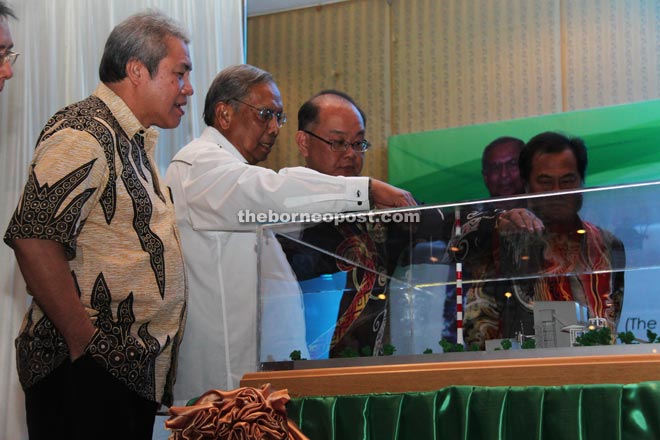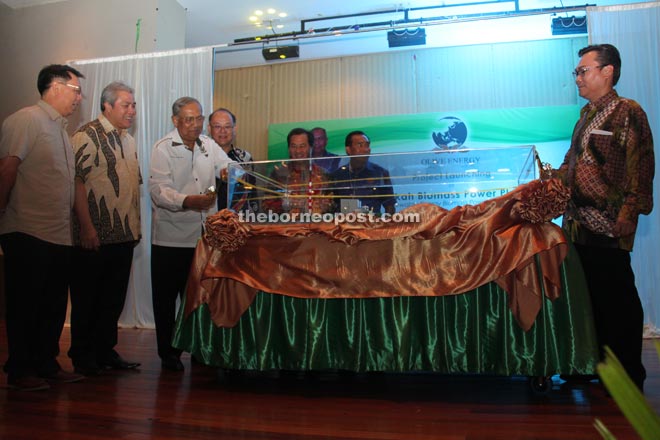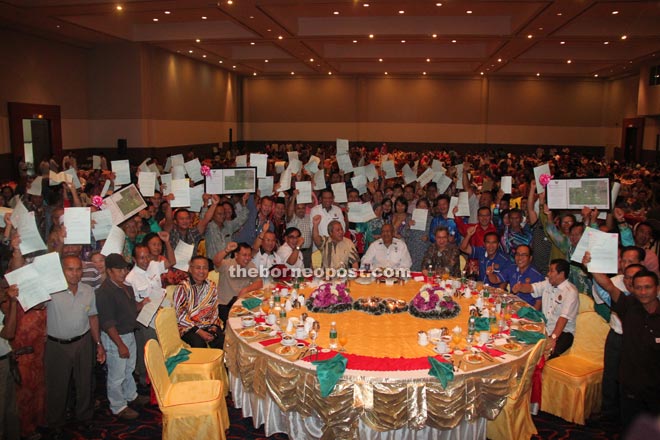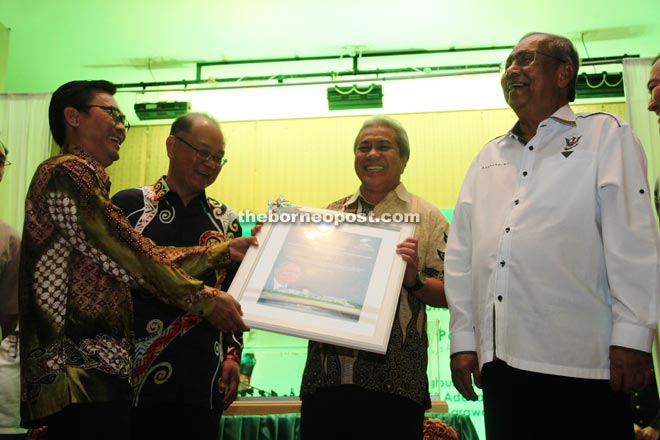Mukah biomass power plant to supply electricity through state’s grid by 2017

(From left) Awang Tengah, Adenan and others looking at the plan for the Mukah Biomass Power Plant.
MUKAH: The state will have its first grid-connected renewable energy biomass power plant soon with the construction of the RM120-million Mukah Biomass Power Plant.
The project carried out by Olive Energy Sdn Bhd is expected to start early next year, with the targetted date of operation on Sept 1, 2017.
Chief Minister Datuk Patinggi Tan Sri Adenan Satem said the transition of the renewable energy plant into the grid was based on willing-buyer and willing-seller basis.
The project involved the development of 12.1 megawatts biomass electricity generation plant in Mukah, and 10 megawatts of the generated electricity would be exported to the grid at 21 sen per kilowatt.
Speaking at the launching ceremony at Kingwood Resort, Mukah yesterday, Adenan said though the power plant was relatively small in size, it was a great start.
“It is good for the palm oil industry as it helps make the industry more sustainable.
“This sustainable practice will definitely help raise our credential in the international arena and create a platform for the Malaysian Palm Oil Industry to counter lobbyists who have painted such a bleak and an imbalanced report of our industry,” he said.
To date, he added, the state had issued 14 power generation licences to companies producing electricity from biomass for own use.
Upon completion, he said the companies would have the capacity to produce 135 megawatts of power.
He lamented that currently less than five per cent of the wastes produced were recycled by the various mills around Sarawak.
“If we were to look at the statistics on palm wastes, we can see that there is opportunity to produce an impressive 300 megawatts of electricity,” he pointed out.
He also said carbon emissions could be reduced by 1.8 million tonnes annually.
“Sarawak is neither blind nor deaf to the importance of developing renewable and sustainable energy,” he said, adding that many renewable energy resources in the state remain untapped at the moment.
He also said the advantage of having biomass power plant was not limited to generation of green energy but to create jobs for graduates and skilled workers.
“I understand that Olive Energy will create about 40 direct employments through this plant. If more biomass power plants are established, it means more job opportunities for our people,” he reiterated.
He said the plant could also be the place providing technical facilities where more steam engineers, boiler operators, mechanical and electrical technicians can be trained and retrained.
And with cheap energy, the state would be able to attract more foreign investments, he added.
He expressed confidence that advancement in technology would enable greater exploration of biomass potential such as higher value added products, thereby maximising the potential of biomass to the state’s economy.
“Various financing schemes are available to improve the attractiveness of investment in renewable energy and green technology,” he said.
He hoped the success of this first project would encourage more palm oil mill owners to be part of Green Renewable Energy initiative.

Adenan (third left) officiating at the event while (from left) Dr Rundi, Awang Tengah, Hong (right) and others look on.

The recipients of the land titles and TOL in a group photograph with the VIPs.

A recipient receives an indigenous communal reserve title from Adenan (second left), while (from left) Awang Tengah and Yussibnosh look on.
“I am confident that with the right approach and smart partnership, we can collaborate to achieve our vision to become a developed state by 2020 by capitalising on the natural resources available in the state without compromising the environment,” he enthused.
According to the chairman of Olive Energy Sdn Bhd, Dato Sri Dr Albert Hong, the power plant is the first of its kind in the world that converts palm oil waste to electricity using high tech Conversion Technology.
“For 90 tons per hour, it is equivalent to the reduction of 60,000 tons of carbon dioxide emission per annum,” he pointed out.
His text of speech was read by chief operating officer (CEO) of Olive Energy Sdn Bhd Sylvester Wong.
According to him, in 2014 Sarawak produced about 3.5 million tons of crude palm oil (CPO) and processed about 17 million tons of fresh fruit bunches (FFB).
He said 40 per cent or about seven million tons were turned into biomass palm residues which would emit harmful greenhouse gases if left in the open field.
“It would then lead to depletion of the ozone layer and pollute the river system. If incinerated, it would result in air pollution,” he said.
Second Minister of Resource Planning and Environment Datuk Amar Awang Tengah Ali Hassan, Assistant Minister in the Chief Minister’s Office (Promotion of Technical Education) Datu Len Talif Salleh, Assistant Minister of Public Utilities (Electricity and Telecommunication) Datuk Dr Stephen Rundi and Balingian assemblyman Yussibnosh Balo attended the function.
Meanwhile, at the event, Adenan presented land titles to 221 people from Kampung Pangkalan Feri Lama, Bedanga, Kampung Tutus Ulu, Kampung Tega and Kampung Sau; temporary occupation licences (TOL) to 80 recipients from Kampung Teh, Mukah and presented indigenous communal reserve titles.
